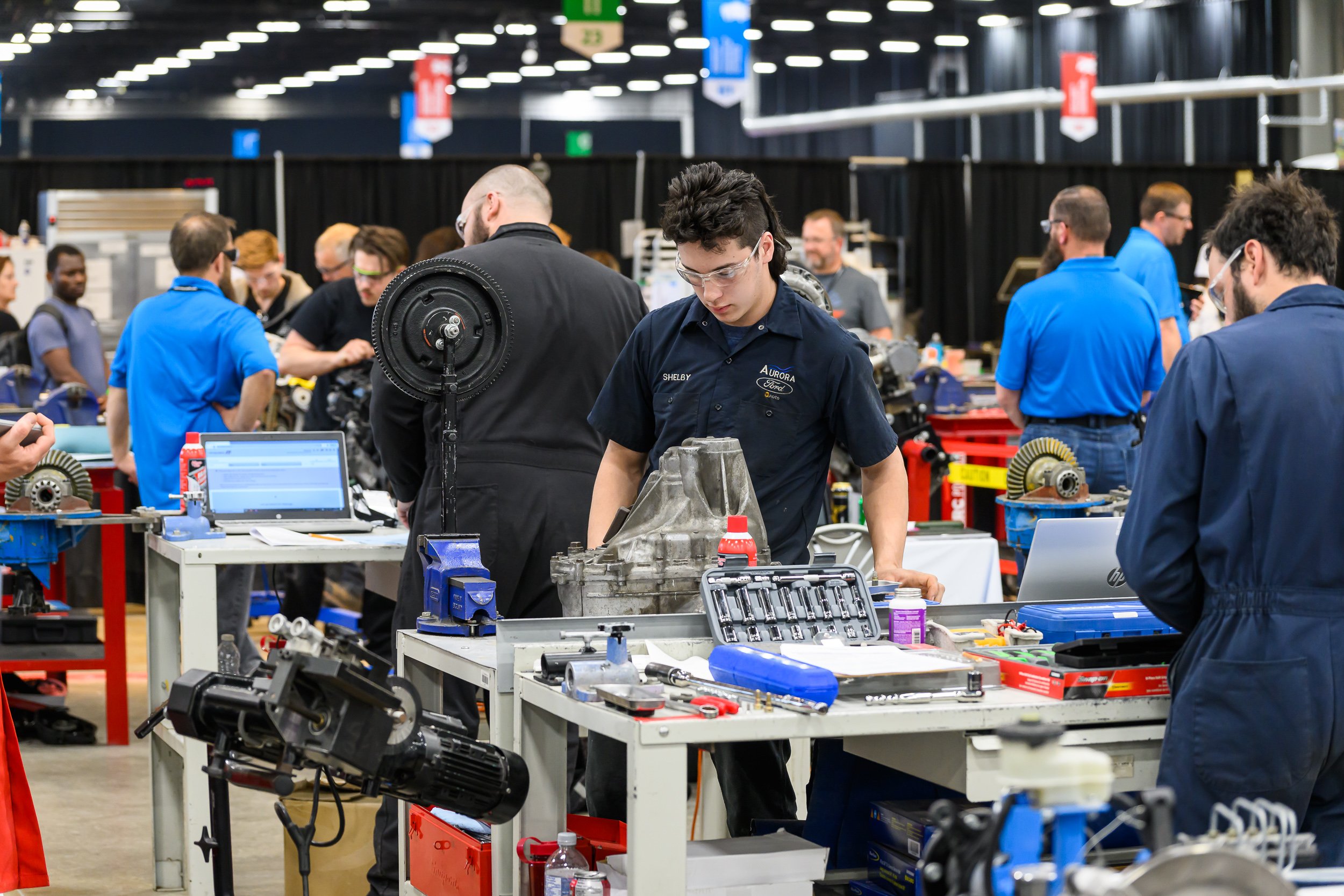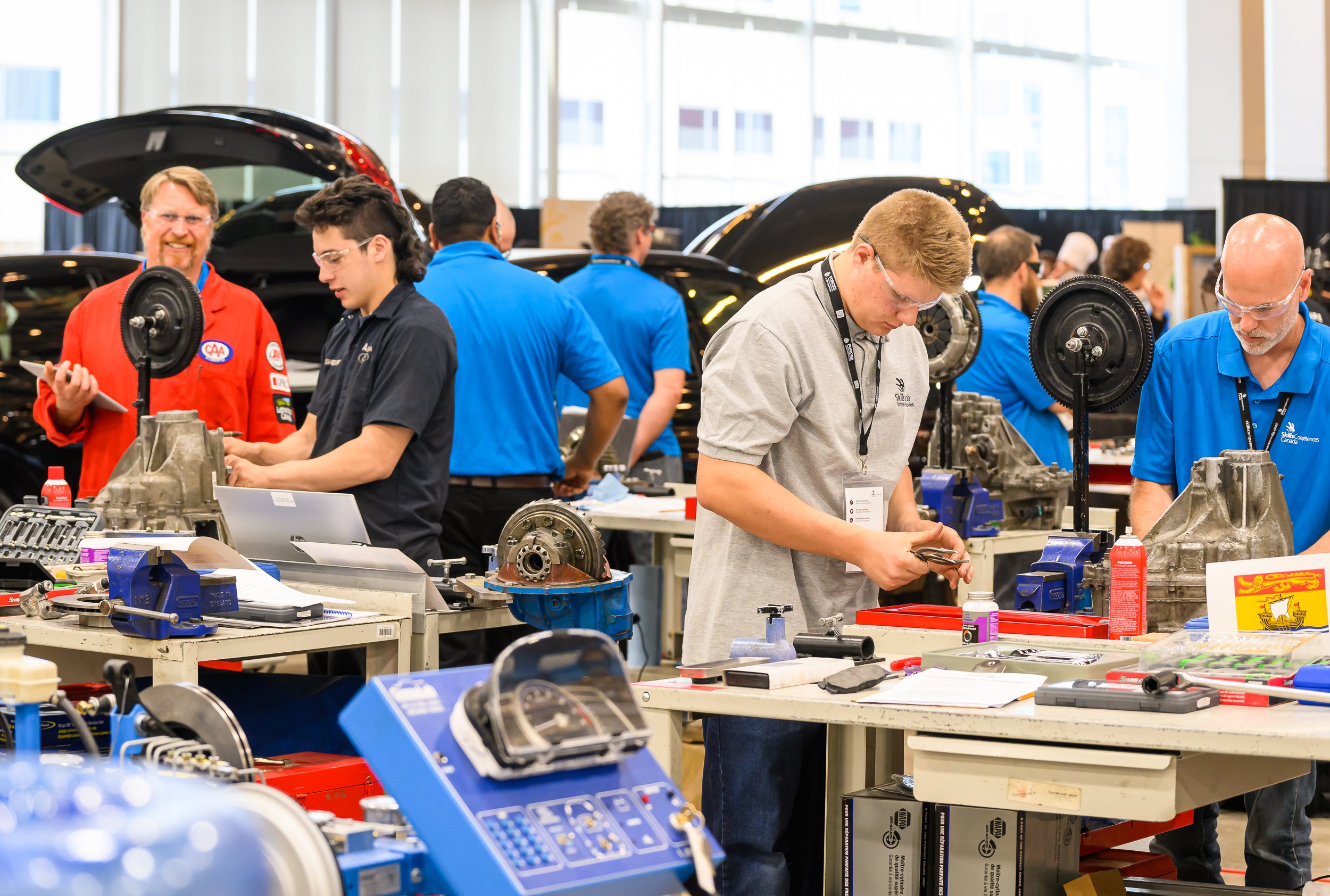Explore Trade and Technology Careers
Transportation
-

Car Painting
A career in car painting involves cleaning and preparing panels for paint applications. Car painters are required to mix and apply undercoats and clear coats as well as refinish plastic substrates. They perform the prepping and painting of objects on steel body panels. In addition, they remove surface paint defects on automotive parts. In these cases, they perform a colour tinting to a blend-able match. Car painters use a variety of equipment including sanders, blow guns, painting tools, spray guns, and polishers.
Typical Duties:
File, grind and sand repaired body surfaces using hand and power tools
Mask and tape auto body surfaces in preparation for painting
Mix paint, blend and match colors
Apply primers and repaint surfaces using brush or spray guns
Determine necessary application of paint for a thorough coat
Check for runs or sags in the pain the ensure the quality of the product.
Sample Job Titles
Automotive painter
Automotive painter apprentice
Painter motor vehicle repair
Companies and Sectors
Automotive painter
Automotive painter apprentice
Painter motor vehicle repair
HOW TO JOIN THE FIELD
Completion of secondary school is usually required.
Completion of a two- to three-year automotive painter apprenticeship program or a combination of one year of work experience in the automotive painter trade and completion of a high school or college automotive painting program is usually required for automotive painter trade certification.
Trade certification is compulsory in Alberta and British Columbia and available, but voluntary, in Newfoundland and Labrador, Prince Edward Island, Nova Scotia, New Brunswick, Ontario, Manitoba, Saskatchewan, Nunavut and the Northwest Territories.
Interprovincial trade certification (Red Seal) is also available to qualified automotive painters.
INDIGENOUS AND REMOTE CONSIDERATIONS
Many Indigenous and remote communities have mechanical knowledge, particularly when it comes to machines used to hunt. This enables people to fix machines in order to continue traditional hunting and gathering activities that sustain life. However, there may be less access to formal training on mechanical knowledge. Many fly-in communities do not have access to the types of equipment and workplace technology learn the ropes in this career. Students from these communities may need to relocate to get their education and training and may also need to travel to job sites once they get a career. However, mechanical knowledge is a highly desirable skill when it comes to life in remote communities where access to replacement parts and equipment is more limited than in other parts of the country.
Although most remote communities have a mechanic in town, some may not have all the tools and equipment to do the auto body work. This may mean that people who wish to pursue this career need to consider relocation for study and employment in this field.
-

Automobile Technology
Besides repairing damaged and defective vehicles, mechanics also conduct routine and scheduled maintenance: balancing and rotating tires, replacing filters, performing oil changes, lubrications and tune-ups, and installing parts such as mufflers, shock absorbers, exhaust pipes, radiators and springs. These repairs and maintenance must be completed to exacting safety standards.
With all of the complex repair and maintenance machinery used and the new technology built into modern automotive components, knowledge of electronics is increasingly desirable in a mechanic. In fact, the new developments in engines, transmissions and suspension systems, and the increased use of electronic components are changing the mechanic’s job into that of a technician, with more emphasis on vehicle diagnosis.
Typical Duties:
Automotive service technicians perform some or all of the following duties:
Review work orders and discuss work with supervisor
Inspect motor in operation, road test motor vehicle, and test automotive systems and components using computerized diagnostic and other testing devices to diagnose and isolate faults
Adjust, repair or replace parts and components of automotive systems including fuel system, brakes, steering and suspension, engine and drive train, emission control and exhaust, cooling and climate control, and electrical and electronic systems using hand tools and other specialized automotive repair equipment
Sample Job Titles
Heavy duty equipment mechanic
Motor vehicle assembler
Air conditioning mechanic
Automotive mechanic
Automotive service technician
Motor repairer
Transmission mechanic
HOW TO JOIN THE FIELD
Completion of secondary school is usually required.
Completion of a four-year automotive service technician apprenticeship program or a combination of over four years of work experience in the trade and high school, college or industry courses in automotive technology is required to be eligible for trade certification.
Interprovincial trade certification (Red Seal) is also available to qualified automotive service technicians.
INDIGENOUS AND REMOTE CONSIDERATIONS
Many Indigenous and remote communities have mechanical knowledge, particularly when it comes to machines used to hunt. This enables people to fix machines in order to continue traditional hunting and gathering activities that sustain life. However, there may be less access to formal training on mechanical knowledge. Many fly-in communities do not have access to the types of equipment and workplace technology learn the ropes in this career. Students from these communities may need to relocate to get their education and training and may also need to travel to job sites once they get a career. However, mechanical knowledge is a highly desirable skill when it comes to life in remote communities where access to replacement parts and equipment is more limited than in other parts of the country.
Although most remote communities have a mechanic in town, some may not have all the tools and equipment to do the auto body work. This may mean that people who wish to pursue this career need to consider relocation for study and employment in this field.
-

Heavy Vehicle Technology
In general, Heavy Equipment Technicians are employed by specialized repair shops and organizations that own or lease heavy equipment used in the construction, mining, forestry, material handling, landscaping, land clearing, agriculture, and transportation industries. Heavy Equipment Technicians must interpret work orders and technical manuals, write service reports, keep equipment cleaned, lubricated, and maintained, diagnose faults or malfunctions, adjust equipment and repair or replace defective parts, components, or systems, test repaired equipment for proper performance, and ensure that the work done meets manufacturers’ specifications and legislated regulations
Typical Duties:
Check bulldozers, cranes, graders and other heavy construction, agricultural, logging and mining equipment for proper performance and inspect equipment to detect faults and malfunctions
Diagnose faults or malfunctions using computerized and other testing equipment to determine extent of repair required
Adjust equipment and repair or replace defective parts, components or systems, using hand and power tools
Test repaired equipment for proper performance and to ensure that work meets manufacturers’ specifications
Clean, lubricate and perform other routine maintenance work on equipment
Service attachments and working tools such as harvesting and tillage equipment, blades, ploughs, winches and side booms
May perform repair work on heavy trucks
May attach components and adjust new farm equipment.
Sample Job Titles:
Construction equipment mechanic
Diesel mechanic
Farm equipment mechanic
Mining mechanic
Companies and Sectors:
Construction sites
Industrial sites
Modern laboratories
Independent shop
Mines
HOW TO JOIN THE FIELD :
Completion of secondary school is usually required. Completion of a three- to five-year apprenticeship program or a combination of over four years of work experience in the trade and some high school, college or industry courses in heavy equipment repair is usually required to be eligible for trade certification. Heavy-duty equipment mechanic trade certification is compulsory in Quebec and Alberta and available, but voluntary, in all other provinces and the territories. Farm equipment mechanic trade certification is available, but voluntary, in Newfoundland and Labrador, Prince Edward Island, Nova Scotia, New Brunswick, Ontario, Manitoba, Saskatchewan, Alberta and British Columbia. Interprovincial trade certification (Red Seal) is also available to qualified heavy-duty equipment technicians and farm equipment mechanics.
INDIGENOUS AND REMOTE CONSIDERATIONS:
Many Indigenous and remote communities have mechanical knowledge, particularly when it comes to machines used to hunt. This enables people to fix machines in order to continue traditional hunting and gathering activities that sustain life. However, there may be less access to formal training on mechanical knowledge. Many fly-in communities do not have access to the types of equipment and workplace technology learn the ropes in this career.
Students from these communities may need to relocate to get their education and training and may also need to travel to job sites once they get a career. However, mechanical knowledge is a highly desirable skill when it comes to life in remote communities where access to replacement parts and equipment is more limited than in other parts of the country. In communities with close proximities to mines or access to work in the mining industry, apprenticeships and on-the-job training may be available. Indigenous and remote communities are catching up to southern Canada when it comes to digital technology and computer skills and industries.
Not all communities have access to reliable, affordable internet and service interruptions are all too common. Access to computers at home is not a given for everyone and Elders and even sometimes younger generations lack computer knowledge, although this situation is undergoing some significant changes at the moment. But even those people in Indigenous and remote communities with interest and high-level skills in computers may not have the same access to opportunities to learn about different programs and may face significant bandwidth issues, limiting their ability to learn and develop in this field. Indigenous and remote students may need qualifying courses or need to augment college learning to be successful in this field. Although with significant improvements currently underway to internet connections in Indigenous and remote communities, careers in this field become more viable and are likely to become more so in years to come.pursue this career need to consider relocation for study and employment in this field.
-

Outdoor Power and Recreation Equipment
With the increasing technical advances currently being made each year, this process involves the use of many computerized diagnostic tools. An even greater variety of tools is used to complete the work depending on the area of expertise you decide to focus on. Besides diagnosis, repairing damaged and defective vehicles and items, mechanics also conduct routine and scheduled maintenance such as engine tune ups, alignment and running gear adjustments, replacement and balancing of tires, replacing the oil and filters, lubrications, engine and handling improvements. Tuning is also required to increase performance and functionality of the varied products. These repairs and maintenance must be completed to exacting safety standards and customer satisfaction.
With all of the high-performance machinery, complex repairs and maintenance necessary, the new technology built into modern outdoor and recreational equipment components, knowledge of electronics is increasingly desirable in a mechanic as this position has developed into a Technician classification through many of these trades.
Typical Duties:
Review work orders and discuss work to be performed with supervisor
Inspect and test engine and other mechanical components using test devices to diagnose and isolate faults
Adjust, repair or replace mechanical or electrical system parts and components using hand tools and equipment
Test and adjust repaired systems for proper performance
Perform scheduled maintenance service on equipment
Advise customers on work performed and general condition of equipment
Determine estimates of repair cost
May repair and rebuild hoisting mechanism and other mechanical systems on industrial trucks and forklifts.
Sample Job Titles:
All-terrain vehicle repairer
Forklift mechanic
Industrial truck repairer
Motor scooter repairer
Motorcycle mechanic
Snowmobile repairer
Companies and Sectors:
Dealerships
Repair shops
Service departments
Self-employed
HOW TO JOIN THE FIELD:
Completion of secondary school is usually required For motorcycle mechanics, completion of a three- to four-year apprenticeship program or a combination of over three years of work experience in the trade and some high school or college courses in motorcycle repair is usually required to be eligible for trade certification.
Motorcycle mechanic trade certification is compulsory in Ontario and Alberta and available, but voluntary, in Newfoundland and Labrador, Prince Edward Island, Nova Scotia, New Brunswick and British Columbia.
Other mechanics in this unit group may require several years of on-the-job training.
Interprovincial trade certification (Red Seal) is also available for qualified motorcycle mechanics.
INDIGENOUS AND REMOTE CONSIDERATIONS:
Many Indigenous and remote communities have mechanical knowledge, particularly when it comes to machines used to hunt. This enables people to fix machines in order to continue traditional hunting and gathering activities that sustain life. However, there may be less access to formal training on mechanical knowledge. Many fly-in communities do not have access to the types of equipment and workplace technology learn the ropes in this career. Students from these communities may need to relocate to get their education and training and may also need to travel to job sites once they get a career. However, mechanical knowledge is a highly desirable skill when it comes to life in remote communities where access to replacement parts and equipment is more limited than in other parts of the country.
In many communities, there would be mechanics needed to fix boats, all-terrain vehicles, snowmobiles, and small equipment so some on-the-job training may be accessed. To pursue this career need to consider relocation for study and employment in this field.
-

Autobody Repair
Autobody technicians use frame machines with computerized, laser and mechanical measuring systems to restore damaged frames and sections to their original shape and location. Less serious dents are straightened with hydraulic jacks or body hand tools. In addition, they remove badly damaged sections of body panels and weld and adhesive bond new sections in to replace them.
A career in autobody repair can cover a number of different areas, such as paint and refinishing, body work and frame work, although paint is considered a separate trade. Knowledge of this profession is applicable to many other areas of the automotive sector, and there is a high demand for skilled employees throughout the industry.

